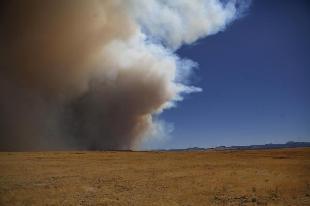
Smoke from the Wallow Wildfire billows above the White Mountains in Springerville, Arizona June 8, 2011. [Xinhua/Reuters Photo]
A wildfire that has been raging in Eastern Arizona since late last month is spreading toward power lines supplying about half of the electricity used by Tucson Electric Power (TEP) Co. customers, authorities said on Thursday.
 |
|
Smoke from the Wallow Wildfire billows above the White Mountains in Springerville, Arizona June 8, 2011. [Xinhua/Reuters Photo] |
"The loss of those lines would interrupt delivery of enough energy to serve more than half of Tucson Electric's anticipated peak energy demand under current weather conditions," the utility said.
The fire is about 12.8 kilometers from the TEP lines coming out of the Springerville Generating Station, and if it gets within a mile or so, the thick smoke could cause power to arc from the lines, said Joe Salkowski, a TEP spokesman.
"The risk from the fire is not so much the flames; it is the smoke," he said in remarks published by The Arizona Republic newspaper.
The company trims the vegetation from underneath the high-power lines, which are suspended from metal towers not likely to burn in the blaze, he said.
Even though Tucson is located away from the fire in south central Arizona about 200 miles (320 kilometers) southwest of Springerville, the power lines are one of the city's primary sources of energy.
TEP could turn to other power plants closer to Tucson and purchase power from other utilities to supply its 375,000 customers if the lines are damaged, he said, adding that doing so would avoid the need for rolling blackouts.
TEP's lines that are threatened by the Wallow Fire run east from the Springerville power plant into New Mexico.
The Wallow fire, which began May 29, has blackened nearly 389, 000 acres (157,545 hectares), making it the second-largest blaze in state history.
Because of high winds and bone-dry terrain, the fire was zero percent contained, meaning firefighters had not even begun to hem it in, much less get it under control.
But fire authorities said they were hopeful Thursday, as winds are expected to be calmer, allowing firefighters to build containment lines and conduct burnouts in an area stretching from Greer to the Eagar and Springerville region, said Kelly Wood, a spokesman for the Pinetop Fire Department.
Even if fire crews manage to stop the flames from spreading, it will take up three weeks or longer to contain it, according to Jim Whittington, spokesman at the Southwest Incident Command Center.
Fire officials said a DC 10 aircraft might be used Thursday to drop retardant on the flames. The plane can drop up to four times as much as the smaller planes that are normally used.
"If we use it, we want to use it efficiently and effectively," said Whittington.
As the Wallow Fire continues to destroy some of eastern Arizona's most scenic lands, the long-term economic effects on its communities could be profound, The Arizona Republic said.
The forests and meadows of the affected areas are the site of vacation homes and abundant outdoor recreation opportunities. They lure visitors from metro Phoenix and across the nation.
Whatever the extent of actual fire damage in Greer, Alpine or other threatened communities, the area's peak summer season hangs in the balance, the report said.
The time when business owners garner a majority of their annual profits could be marked by cleanup efforts, cancellations and other repercussions of the wildfire, said the report.